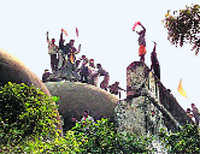Satya Prakash
Tribune News Service
New Delhi, August 8
Ahead of Friday’s crucial hearing on cross-appeals in the Ayodhya case, the Shia Central Waqf Board, Uttar Pradesh, on Tuesday filed an affidavit in the Supreme Court, saying a mosque can be built in a Muslim dominated area “at a reasonable distance from the most revered place of birth of Maryada Puroshottam Ram”.
The affidavit gives a new twist to the controversy as it opposes the stand of the Sunni Central Waqf Board, which has been fighting a protracted legal battle for rebuilding Babri mosque.
The affidavit said: “Sunni Central Waqf Board, UP, is under the dominant control of Sunni hardliners, the fanatics and non-believers in peaceful co-existence, who have absolutely no stake in the present case.”
Quoting from various inscriptions, the affidavit said: “These inscriptions established beyond reasonable doubt that the said Babri masjid was built by Mir Baqi, a Shia wakif, who created a Shia waqf. Being a Shia waqf, the said masjid’s last Mutawalli (1949) was admittedly a Shia.”
“Babri masjid is a Shia property and not a Sunni waqf property as is being claimed by Sunni Waqf Board. Effort of Shia Central Waqf Board will definitely bring about an amicable solution of the dispute and usher in a new era for both the larger denominations to live in peace and harmony.”
“... since Babri masjid is a Shia Waqf Board property, Shia Central Waqf Board UP alone is entitled to negotiate and arrive at a peaceful settlement with other remaining stakeholders,” the affidavit submitted.
It requested the top court to appoint, in the larger public interest, a committee headed by a retired Supreme Court judge to suggest proposals for an amicable settlement. The committee should include two retired judges of the Allahabad High Court, Uttar Pradesh Chief Minister or his nominee, a nominee from the PMO, Shia Central Waqf Board, Nirmohi Akhara (a party to the dispute) and the Hindu community, the affidavit suggested.
Almost seven years after the Allahabad High Court’s order dividing the 2.7-acre disputed land at the Ram Janmabhoomi-Babri Masjid site equally between Ram Lalla, Nirmohi Akhara and Sunni Wakf Board, the Supreme Court will take up cross-appeals filed by various parties on August 11.
The appeals against the September 30, 2010 verdict of the Allahabad High would be heard by a three-judge Bench of Justice Dipak Misra, Justice Ashok Bhushan and Justice S Abdul Nazeer at 2 pm on Friday.
The Shia Central Waqf Board — which is one of the parties in the matter — said: “…to bring quietus, masjid can be located in a Muslim-dominated area at a reasonable distance from the most revered place of birth of Maryada Purshottam Sri Ram.”
Claiming that the disputed site was its property, the Shia board said only it was entitled to hold negotiations. It requested the top court to give it time to set up a committee for exploring an amicable solution of the problem.
“Shia Central Waqf Board is of the view that closeness of place of worships that is masjid and mandir of the two litigating denominations should be avoided in as much as both denominations, using loudspeakers tend to disturb the religious performances of each other, often leading to conflicts and acrimony,” the affidavit said.
Hindus believe that Lord Ram was born in Ayodhya thousands of years ago. During Mughal emperor Babar’s rule, a mosque was constructed at the place in 1528 after destroying the temples existing there.
The RSS, Vishwa Hindu Parishad and BJP have been running a campaign for the construction of a Ram temple in Ayodhya.
On December 6, 1992, kar sevaks of right-wing Hindu organisations demolished the disputed structure. Many BJP leaders, including LK Advani and Murli Manohar Joshi, are facing a criminal case in connection with the demolition.
But the civil dispute over 2.7 acres is a separate one that has been on since 1961 when the Sunni Wakf Board took the matter to court.
Bq
Fresh twist: ‘Negotiation rights ours’
* The Shia waqf board claimed since Babri masjid is a Shia property and not that of Sunni waqf board, it alone had right to negotiate with other stakeholders
* It claims Sunni waqf board is under the control of Sunni hardliners ‘who have absolutely no stake in the present case’
* It urged the SC to appoint a committee headed by a retired SC judge to suggest proposals for an amicable settlement
Unlock Exclusive Insights with The Tribune Premium
Take your experience further with Premium access.
Thought-provoking Opinions, Expert Analysis, In-depth Insights and other Member Only Benefits
Already a Member? Sign In Now










